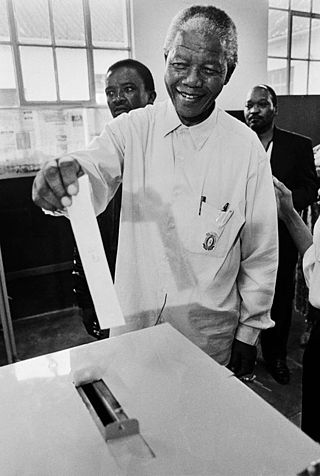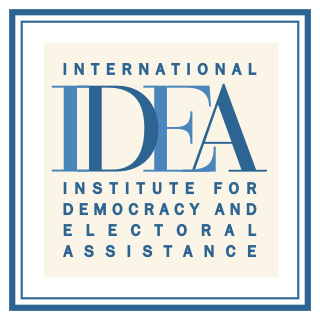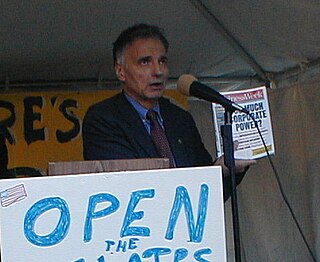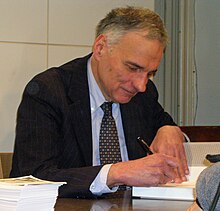
Democracy is a system of government in which state power is vested in the people or the general population of a state. According to the United Nations, democracy "provides an environment that respects human rights and fundamental freedoms, and in which the freely expressed will of people is exercised."

An election is a formal group decision-making process by which a population chooses an individual or multiple individuals to hold public office.

Ralph Nader is an American perennial presidential candidate, political activist, author, lecturer, and attorney noted for his involvement in consumer protection, environmentalism, and government reform causes. He became famous in the 1960s and 1970s for his book Unsafe at Any Speed, which criticized the automotive industry for its safety record and helped lead to the passage of the National Traffic and Motor Vehicle Safety Act in 1966.

Direct democracy or pure democracy is a form of democracy in which the electorate decides on policy initiatives without elected representatives as proxies. This differs from the majority of currently established democracies, which are representative democracies. The theory and practice of direct democracy and participation as its common characteristic was the core of work of many theorists, philosophers, politicians, and social critics, among whom the most important are Jean Jacques Rousseau, John Stuart Mill, and G.D.H. Cole.
American electoral politics have been dominated by successive pairs of major political parties since shortly after the founding of the republic of the United States. Since the 1850s, the two largest political parties have been the Democratic Party and the Republican Party—which together have won every United States presidential election since 1852 and controlled the United States Congress since at least 1856. Despite keeping the same names, the two parties have evolved in terms of ideologies, positions, and support bases over their long lifespans, in response to social, cultural, and economic developments—the Democratic Party being the left-of-center party since the time of the New Deal, and the Republican Party now being the right-of-center party.

E-democracy, also known as digital democracy or Internet democracy, uses information and communication technology (ICT) in political and governance processes. The term is credited to digital activist Steven Clift. By using 21st-century ICT, e-democracy seeks to enhance democracy, including aspects like civic technology and E-government. Proponents argue that by promoting transparency in decision-making processes, e-democracy can empower all citizens to observe and understand the proceedings. Also, if they possess overlooked data, perspectives, or opinions, they can contribute meaningfully. This contribution extends beyond mere informal disconnected debate; it facilitates citizen engagement in the proposal, development, and actual creation of a country's laws. In this way, e-democracy has the potential to incorporate crowdsourced analysis more directly into the policy-making process.
The Citizens' Debate Commission (CDC) is a nonpartisan American organization, formed in 2004, that was established to sponsor future general election presidential debates.
First National Bank of Boston v. Bellotti, 435 U.S. 765 (1978), is a U.S. constitutional law case which defined the free speech right of corporations for the first time. The United States Supreme Court held that corporations have a First Amendment right to make contributions to ballot initiative campaigns. The ruling came in response to a Massachusetts law that prohibited corporate donations in ballot initiatives unless the corporation's interests were directly involved.
Civic journalism is the idea of integrating journalism into the democratic process. The media not only informs the public, but it also works towards engaging citizens and creating public debate. The civic journalism movement is an attempt to abandon the notion that journalists and their audiences are spectators in political and social processes. In its place, the civic journalism movement seeks to treat readers and community members as participants.

The International Institute for Democracy and Electoral Assistance is an intergovernmental organization that works to support and strengthen democratic institutions and processes around the world, to develop sustainable, effective and legitimate democracies. It has regional offices in Europe, Latin America and the Caribbean, Asia and the Pacific and Africa and West Asia. The organization is headquartered in Stockholm, Sweden.

The National initiative is a proposed process to petition an initiative at the federal level in the United States via a national vote on the national ballot measure. While some U.S. states allow direct or indirect initiatives, there are currently no national initiatives in the United States.

The question of whether the governance of the European Union (EU) lacks democratic legitimacy has been debated since the time of the European Economic Community in the late 1970s. This led in part to an elected European Parliament being created in 1979 and given the power to approve or reject EU legislation. Since then, usage of the term has broadened to describe newer issues facing the European Union. Voter turnout at the elections to the European Parliament fell consecutively at every election from the first in 1979 up to 2014 when it hit a low of 42.54%, before finally rising in 2019. The 2014 turnout figure is lower than that of any national election in the 27 countries of the European Union, where turnout at national elections averages 68% across the EU.

The 2000 presidential campaign of Ralph Nader, political activist, author, lecturer and attorney, began on February 21, 2000. He cited "a crisis of democracy" as motivation to run. He ran in the 2000 United States presidential election as the nominee of the Green Party. He was also nominated by the Vermont Progressive Party and the United Citizens Party of South Carolina. The campaign marked Nader's second presidential bid as the Green nominee, and his third overall, having run as a write-in campaign in 1992 and a passive campaign on the Green ballot line in 1996.
The 2008 presidential campaign of Ralph Nader, political activist, author, lecturer and attorney began on February 24, 2008. He announced his intent to run as an independent candidate, on NBC's Meet The Press. It was Nader's fifth campaign; he ran in the four election cycles prior to 2008: 1992, 1996, 2000, and 2004. The 2008 election was the third in which he had officially run a national campaign. While Nader ran as an independent, in some states he had ballot access with the Independent-Ecology Party, the Natural Law Party, and the Peace and Freedom Party. Nader received 738,475 votes.
A citizens' assembly is a group of people selected by lottery from the general population to deliberate on important public questions so as to exert an influence. Other names and variations include citizens' jury, citizens' panel, people's panel, mini-publics,people's jury, policy jury, citizens' initiative review, consensus conference and citizens' convention.

The Justice Party is a political party in the United States. It was organized in November 2011 by a group of political activists including former mayor of Salt Lake City Rocky Anderson as an alternative to what they saw as a duopoly of the two major political parties. One of the major goals of the Justice Party is removing corporate domination and other concentrated wealth from politics. In 2012, the Justice Party nominated Rocky Anderson for president and Luis J. Rodriguez for vice president. The Justice Party endorsed Bernie Sanders during the primary election in 2016.
Eleven national referendums were held in Switzerland during 2013. Voters approved six proposals related to spatial planning, executive pay, family policy, amendments to the laws on asylum and epidemics and an increase in the length of petrol station shop opening hours. The other five proposals on directly electing the Federal Council, abolishing compulsory military service, limiting salaries in a company to 12 times the lowest paid worker, tax credits for stay-at-home parents and an increase in road tax were rejected.
A referendum is a direct vote in which an entire electorate is asked to either accept or reject a particular proposal. This article summarises referendum laws and practice in various countries.
A Civic application is an application software designed to encourage users to participate in and learn more about government.

A constitutional referendum was held in Senegal on 20 March 2016. Proposed by President Macky Sall, it was the fourth constitutional referendum in Senegalese history. The proposed changes to the constitution were approved by 62% of voters. Voter turnout was 39%. A majority voted in favour in thirteen of the fourteen regions, with only Diourbel Region seeing a majority against.











